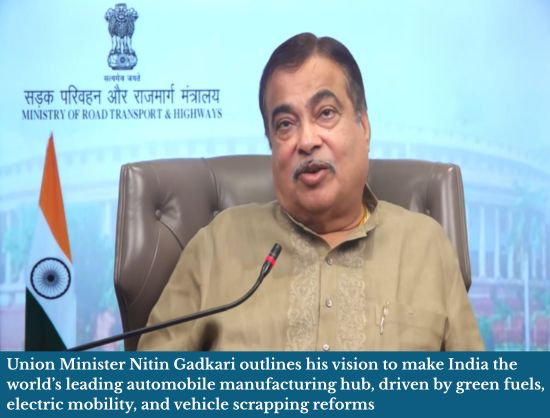Our Terms & Conditions | Our Privacy Policy
India Eyes Global Leadership in Auto Manufacturing with Green and Sustainable Push: Gadkari – Asia Pacific
Union Minister for Road Transport and Highways, Nitin Gadkari, has reiterated his ambitious vision of positioning India as the world’s leading automobile manufacturing hub within the next five years, with a clear focus on clean fuels, technology innovation, and circular economy initiatives like vehicle scrapping.
Addressing the gathering at the 65th Annual Session of Automotive Component Manufacturers Association (ACMA) virtually, Gadkari underlined that the auto sector — currently valued at about INR 22 lakh crore — holds immense untapped potential to double in size while driving both economic growth and environmental responsibility. “With the support of stakeholders, we can make India the number one automobile industry in the world. It is a difficult challenge, but not impossible,” he said.
Acknowledging that transport contributes 40 percent of India’s air pollution and that crude oil imports cost the exchequer INR 22 lakh crore annually, Gadkari emphasised the urgent need to diversify towards non-polluting fuels. He outlined the government’s “smart, safe and sustainable” mobility vision for 2030, anchored in electric vehicles, ethanol, hydrogen, biofuels, LNG and CNG. “Our approach is market-based and need-based. Every fuel has its own economics and regional relevance. India will not depend on a single solution but promote a bouquet of solutions,” he said.
On the rollout of E20 petrol (20 percent ethanol blend) across India earlier this year, Gadkari dismissed concerns over vehicle readiness as “propaganda from vested interests”. He cited international examples, including Brazil, which uses 27 percent ethanol blends without issue.
“Competent authorities like ARAI and automobile manufacturers have certified ethanol blends. There is no compromise on quality, and no adverse consumer impact has been reported,” he asserted.
He added that India’s eventual transition to higher blends and flex-fuel vehicles would follow rigorous testing and phased adoption, ensuring consumer safety and industry preparedness. “Ethanol is Swadeshi, supports farmers, reduces imports, and cuts pollution. It is in the nation’s best interest,” Gadkari stressed.
Gadkari also announced that Tata Motors has been awarded an order to supply flash-charging electric buses, marking a step forward in electrifying India’s public transport system. “Our vision is green, safe, affordable, inclusive, and technology-driven mobility. Developing cost-effective public transport with low capital cost is critical to reducing pollution,” he said.
Highlighting the success of the government’s vehicle scrapping policy, Gadkari noted that component costs could reduce by up to 55 percent, boosting global competitiveness for Indian manufacturers. The scrappage ecosystem, he said, is expected to generate 70 lakh new jobs, contribute INR 40,000 crore in GST revenue, and significantly cut carbon emissions — equivalent to planting 26 crore trees.
“The recovery of scrap metals like steel, aluminium, platinum and palladium will lower import dependence and bring down component costs by 25 percent. This is not just environmental reform; it’s a profitable business model for all stakeholders,” Gadkari said, urging the private sector to set up more scrappage centres.
The minister emphasised that ongoing policy reforms, including recent reductions in GST on vehicles, are creating a “win-win situation”. Consumers benefit from price cuts, automakers see rising demand, dealers gain higher sales, MSMEs and startups find innovation opportunities, and the government collects more taxes through increased consumption.
“The future of the Indian auto industry is bright. With cooperation, coordination, and communication among all stakeholders, we can transform India into the global leader in mobility,” Gadkari concluded.
Images are for reference only.Images and contents gathered automatic from google or 3rd party sources.All rights on the images and contents are with their legal original owners.



Comments are closed.